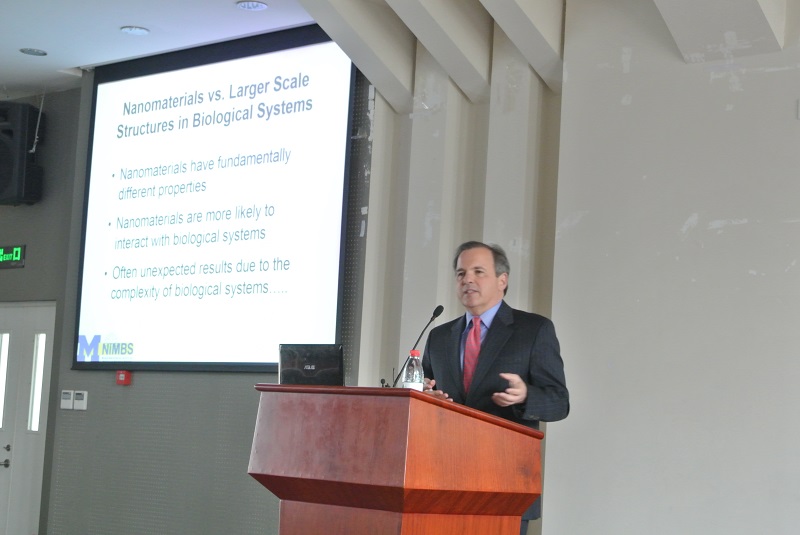Topic: Nanotechnology Therapeutics: Moving Towards the Clinic
Speaker: Prof. James R. Baker, Jr
Date: April 28(Monday), 10 a.m.
Location: Meeting room 210, COE Building No.1
Host: Zhifei Dai
Abstract:
Our group has developed a number of dendrimer-based targeted therapeutics for epithelial, lung and ovarian cancers. These macromolecules are actively targeted to tumors that over-express receptors for a number of receptors for small molecule ligands including folate, riboflavin, RGD and EGF. Our first generation therapeutics used a dendrimer scaffold combined with linking multiple targeting and therapeutic molecules to produce multifunctional combinatory therapeutics. Unfortunately, the complexity of these molecules prevented their entry into clinical trials. We have re-designed the platform using a simplified approach; polyvalent small molecule therapeutics which also act as ligands to target the nanoparticle and kill cancer cells. The revised scaffold still uses a dendritic polymer that is uniquely suited to biomedical applications in that it can be uniformly produced and yet has a diameter les than 10 nanometers. The goal of this work is to develop several polyvalent therapeutics and imaging agents and advance these materials through preclinical animal efficacy and toxicity trials. If this approach is successful in vivo, it can facilitate the concept of targeting many small molecule drugs on nanoparticles to address varied tumor types with different genetic or enzymatic alterations associated with individual cancers.
Brief introduction of speaker:

James R. Baker, Jr., M.D., Emeritus Professor of Medicine, Chief of the Division of Allergy and Clinical Immunology at the University of Michigan, and Director of the Michigan Nanotechnology Institute for Medicine and the Biological Sciences (MNIMBS).
Dr. Baker completed his undergraduate education at Williams College in Williamstown, Massachusetts. After an internship and internal medicine residency at the Walter Reed Army Medical Center in Washington, D.C., he completed an Allergy and Clinical Immunology Fellowship, also at Walter Reed and at NIAID. In 1998, Dr. Baker was appointed Director of the newly organized Center for Biologic Nanotechnology at the University of Michigan, and in 2001 he was inaugurated as the first recipient of the Ruth Dow Doan Endowed Professorship in Biologic Nanotechnology. Because Dr. Baker has distinguished himself as both a national and an international leader in the field of biologic nanotechnology, in October of 2001 he was named as the first recipient of the U-M Dean's Innovation Award. In 2002, he was appointed Director of Research in the newly created Michigan Bioterrorism and Health Preparedness Research and Training Center in the University's School of Public Health. In 2003, he was appointed to serve as a member of the newly formed Nanotechnology Technical Advisory Group (N-TAG) of the President's Council of Advisors on Science and Technology (PCAST) to the Executive Office of the President of US. In 2004, Dr. Baker was named as one of the three editors of the National Nanotechnology Initiatives' research directives. He is a member of the President's Council of Advisors on Science and Technology (PCAST) and is the only physician on this important Office of Science and Technology Policy committee. Following the success of the Center for Biologic Nanotechnology, in 2005 the U-M Board of Regents formed the Michigan Nanotechnology Institute for Medicine and Biological Sciences and appointed Dr. Baker as its first director. In 2012, Dr. Baker was appointed Professor Emeritus (Active), Division of Allergy at University of Michigan Medical Center.
Dr. Baker has over 25 years experience in basic biologic research, concentrating in immunology and host defense. His long-standing research in immunology has helped define the basis of several autoimmune diseases. He has become an internationally recognized expert in nanotechnology, nanomolecular materials in biomedical applications, and the emerging field of nanomedicine. Recently he has been involved in work concerning gene transfer and drug delivery. These studies have produced new vector systems for gene transfer using dendritic polymers, which have the potential to revolutionize pharmaceutical therapy. So far, he has published 305 papers in the scholarly journals, such as Arthritis Rheum., J. Med. Chem., Adv. Mater., Cancer Res., and his lab has been funded by a series of grants from NIAID, DARPA and the NCI. He is also serving as Chief editor of WIREs Nanomedicine and Nanobiotechnology.